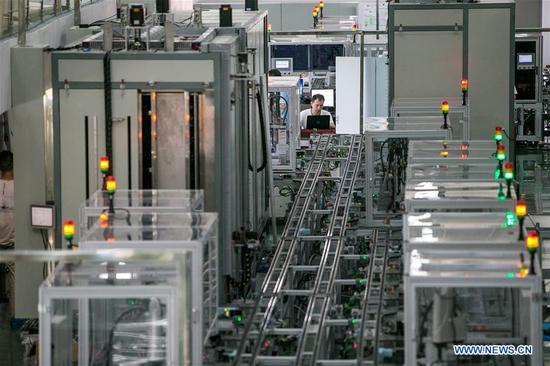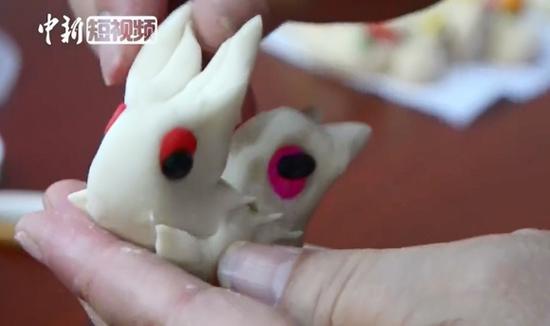
Qin Zhongjun, a molecular biologist at the Center for Excellence in Molecular Plant Sciences, Shanghai Institute of Plant Physiology and Ecology, of Chinese Academy of Sciences, introduces his research in Shanghai, east China, Aug. 2, 2018. Brewer's yeast, one-third of whose genome is said to share ancestry with a human's, has 16 chromosomes. However, Chinese scientists have managed to fit nearly all its genetic material into just one chromosome while not affecting the majority of its functions, according to a paper released Thursday on Nature's website. Qin Zhongjun and his team used CRISPR-Cas9 genome-editing to create a single chromosome yeast strain, the paper said. (Xinhua/Zhang Yuwei)

Qin Zhongjun, a molecular biologist, and his team and students pose for photo at the Center for Excellence in Molecular Plant Sciences, Shanghai Institute of Plant Physiology and Ecology, of Chinese Academy of Sciences in Shanghai, east China, July 31, 2018. Brewer's yeast, one-third of whose genome is said to share ancestry with a human's, has 16 chromosomes. However, Chinese scientists have managed to fit nearly all its genetic material into just one chromosome while not affecting the majority of its functions, according to a paper released Thursday on Nature's website. Qin Zhongjun and his team used CRISPR-Cas9 genome-editing to create a single chromosome yeast strain, the paper said. (Xinhua/Ding Ting)

Photo taken on July 31, 2018 shows single chromosome yeast strain at the Center for Excellence in Molecular Plant Sciences, Shanghai Institute of Plant Physiology and Ecology, of Chinese Academy of Sciences in Shanghai, east China. Brewer's yeast, one-third of whose genome is said to share ancestry with a human's, has 16 chromosomes. However, Chinese scientists have managed to fit nearly all its genetic material into just one chromosome while not affecting the majority of its functions, according to a paper released Thursday on Nature's website. Qin Zhongjun, a molecular biologist, and his team used CRISPR-Cas9 genome-editing to create a single chromosome yeast strain, the paper said. (Xinhua/Ding Ting)

A team member of molecular biologist Qin Zhongjun watches a single chromosome yeast strain through electron microscope at the Center for Excellence in Molecular Plant Sciences, Shanghai Institute of Plant Physiology and Ecology, of Chinese Academy of Sciences in Shanghai, east China, July 31, 2018. Brewer's yeast, one-third of whose genome is said to share ancestry with a human's, has 16 chromosomes. However, Chinese scientists have managed to fit nearly all its genetic material into just one chromosome while not affecting the majority of its functions, according to a paper released Thursday on Nature's website. Qin Zhongjun and his team used CRISPR-Cas9 genome-editing to create a single chromosome yeast strain, the paper said. (Xinhua/Ding Ting)

Qin Zhongjun, a molecular biologist at the Center for Excellence in Molecular Plant Sciences of the Shanghai Institute of Plant Physiology and Ecology under the Chinese Academy of Sciences, introduces his research in Shanghai, east China, July 31, 2018. Brewer's yeast, one-third of whose genome is said to share ancestry with humans, has 16 chromosomes. However, Chinese scientists have managed to fit nearly all its genetic material into just one chromosome while not affecting the majority of its functions, according to a paper released Thursday on the website of the journal Nature. Qin Zhongjun and his team used CRISPR-Cas9 genome-editing to create a single-chromosome yeast strain, the paper said. (Xinhua/Ding Ting)

Qin Zhongjun, a molecular biologist at the Center for Excellence in Molecular Plant Sciences of the Shanghai Institute of Plant Physiology and Ecology under the Chinese Academy of Sciences, introduces his research in Shanghai, east China, July 31, 2018. Brewer's yeast, one-third of whose genome is said to share ancestry with humans, has 16 chromosomes. However, Chinese scientists have managed to fit nearly all its genetic material into just one chromosome while not affecting the majority of its functions, according to a paper released Thursday on the website of the journal Nature. Qin Zhongjun and his team used CRISPR-Cas9 genome-editing to create a single-chromosome yeast strain, the paper said. (Xinhua/Ding Ting)

Qin Zhongjun (R), a molecular biologist at the Center for Excellence in Molecular Plant Sciences of the Shanghai Institute of Plant Physiology and Ecology under the Chinese Academy of Sciences, discusses with his team member in Shanghai, east China, July 31, 2018. Brewer's yeast, one-third of whose genome is said to share ancestry with humans, has 16 chromosomes. However, Chinese scientists have managed to fit nearly all its genetic material into just one chromosome while not affecting the majority of its functions, according to a paper released Thursday on the website of the journal Nature. Qin Zhongjun and his team used CRISPR-Cas9 genome-editing to create a single-chromosome yeast strain, the paper said. (Xinhua/Ding Ting)























